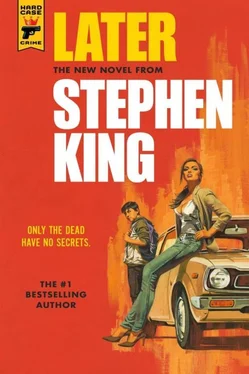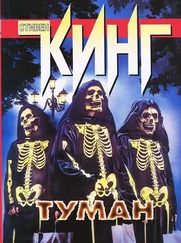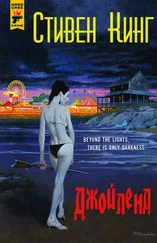She stroked my neck, ignoring someone (maybe the man who gave us the finger) who honked at us and drove around our car. “Honey, that’s just your imagination. He was covered up.”
“Not the one on the ground, the one standing beside him. He waved at me.”
She stared at me for a long time, seemed like she was going to say something, then just buckled my seatbelt. “I think maybe we should skip the party. How does that sound to you?”
“Good,” I said. “I don’t like Lily anyway. She sneaky-pinches me during Story Time.”
We went home. Mom asked me if I could keep down a cup of cocoa and I said I could. We drank cocoa together in the living room. I still had Lily’s present. It was a little doll in a sailor suit. When I gave it to Lily the next week, instead of sneaky-pinching me, she gave me a kiss right on the mouth. I got teased about that and never minded a bit.
While we were drinking our cocoa (she might have put a little something extra in hers), Mom said, “I promised myself when I was pregnant that I’d never lie to my kid, so here goes. Yeah, that guy was probably dead.” She paused. “No, he was dead. I don’t think even a bike helmet would have saved him, and I didn’t see one.”
No, he wasn’t wearing a helmet. Because if he’d been wearing it when he got hit (it was a taxi that did it, we found out), he would have been wearing it as he stood beside his body. They’re always wearing what they had on when they died.
“But you only imagined you saw his face, honey. You couldn’t have. Someone covered him up with a jacket. Someone very kind.”
“He was wearing a tee-shirt with a lighthouse on it,” I said. Then I thought of something else. It was only a little bit cheery, but after something like that, I guess you take what you can get. “At least he was pretty old.”
“Why do you say that?” She was looking at me oddly. Looking back on it, I think that was when she started to believe, at least a little bit.
“His hair was white. Except for the parts with the blood in it, that is.”
I started to cry again. My mother hugged me and rocked me and I went to sleep while she was doing it. I tell you what, there’s nothing like having a mother around when you’re thinking of scary shit.
We got the Times delivered to our door. My mother usually read it at the table in her bathrobe while we ate breakfast, but the day after the Central Park man she was reading one of her manuscripts instead. When breakfast was over, she told me to get dressed and maybe we’d ride the Circle Line, so it must have been a Saturday. I remember thinking it was the first weekend the Central Park man was dead in. That made it real all over again.
I did what she said, but first I went into her bedroom while she was in the shower. The newspaper was on the bed, open to the page where they put dead folks who are famous enough for the Times . The picture of the Central Park man was there. His name was Robert Harrison. At four I was already reading at a third-grade level, my mother was very proud of that, and there were no tough words in the headline of the story, which was all I read: CEO OF LIGHTHOUSE FOUNDATION DIES IN TRAFFIC ACCIDENT.
I saw a few more dead people after that—the saying about how in life we are in death is truer than most people know—and sometimes I said something to Mom, but mostly I didn’t because I could see it upset her. It wasn’t until Mrs. Burkett died and Mom found her rings in the closet that we really talked about it again.
That night after she left my room I thought I wouldn’t be able to sleep, and if I did I would dream about the Central Park man with his split-open face and bones sticking out of his nose, or about my mother in her coffin, but also sitting on the steps to the pulpit, where only I could see her. But so far as I can remember, I didn’t dream about anything. I got up the next morning feeling good, and Mom was feeling good, and we joked around like we sometimes did, and she stuck my turkey on the fridge and then put a big smackeroo on it, which made me giggle, and she walked me to school, and Mrs. Tate told us about dinosaurs, and life went on for two years in the good ways it usually did. Until, that is, everything fell apart.
When Mom realized how bad things were, I heard her talking to Anne Staley, her editor friend, about Uncle Harry on the phone. Mom said, “He was soft even before he went soft. I realize that now.”
At six I wouldn’t have had a clue. But by then I was eight going on nine, and I understood, at least partly. She was talking about the mess her brother had gotten himself—and her—into even before the early-onset Alzheimer’s carried off his brains like a thief in the night.
I agreed with her, of course; she was my mother, and it was us against the world, a team of two. I hated Uncle Harry for the jam we were in. It wasn’t until later, when I was twelve or maybe even fourteen, that I realized my mother was also partly to blame. She might have been able to get out while there was still time, probably could have, but she didn’t. Like Uncle Harry, who founded the Conklin Literary Agency, she knew a lot about books but not enough about money.
She even got two warnings. One was from her friend Liz Dutton. Liz was an NYPD detective, and a great fan of Regis Thomas’s Roanoke series. Mom met her at a launch party for one of those books, and they clicked. Which turned out to be not so good. I’ll get to it, but for now I’ll just say that Liz told my mother that the Mackenzie Fund was too good to be true. This might have been around the time Mrs. Burkett died, I’m not sure about that, but I know it was before the fall of 2008, when the economy went belly-up. Including our part of it.
Uncle Harry used to play racquetball at some fancy club near Pier 90, where the big boats dock. One of the friends he played with was a Broadway producer who told him about the Mackenzie Fund. The friend called it a license to coin money, and Uncle Harry took him seriously about that. Why wouldn’t he? The friend had produced like a bazillion musicals that ran on Broadway for a bazillion years, plus also all over the country, and the royalties just poured in. (I knew exactly what royalties were—I was a literary agent’s kid.)
Uncle Harry checked it out, talked to some big bug who worked for the Fund (although not to James Mackenzie himself, because Uncle Harry was just a small bug in the great scheme of things), and put in a bunch of money. The returns were so good that he put in more. And more. When he got the Alzheimer’s—and he went downhill really fast—my mother took over all the accounts, and she not only stuck with the Mackenzie Fund, she put even more money into it.
Monty Grisham, the lawyer who helped with contracts back then, not only told her not to put in more, he told her to get out while the getting was good. That was the other warning she got, and not long after she took over the Conklin Agency. He also said that if a thing looked too good to be true, it probably was.
I’m telling you everything I found out in little driblets and drablets—like that overheard conversation between Mom and her editor pal. I’m sure you get that, and I’m sure you don’t need me to tell you that the Mackenzie Fund was actually a big fat Ponzi scheme. The way it worked was Mackenzie and his merry band of thieves took in mega-millions and paid back big percentage returns while skimming off most of the investment dough. They kept it going by roping in new investors, telling each one how special he or she was because only a select few were allowed into the Fund. The select few, it turned out, were thousands, everyone from Broadway producers to wealthy widows who stopped being wealthy almost overnight.
Читать дальше








